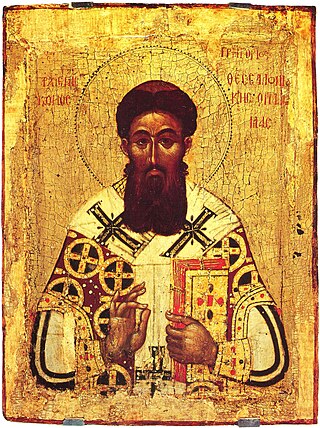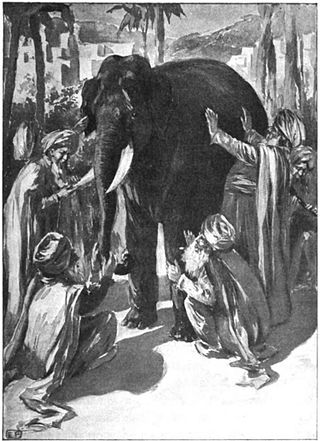Related Research Articles

Metaphysics is the branch of philosophy that studies the fundamental nature of reality. This includes the first principles of: being or existence, identity, change, space and time, cause and effect, necessity, actuality, and possibility.
Theology is the systematic study of the nature of the divine, or more broadly of religious belief. It is taught as an academic discipline, typically in universities and seminaries. It occupies itself with the unique content of analyzing the supernatural, but also deals with religious epistemology, asks and seeks to answer the question of revelation. Revelation pertains to the acceptance of God, gods, or deities, as not only transcendent or above the natural world, but also willing and able to interact with the natural world and to reveal themselves to humankind.
The teleological argument is an argument for the existence of God or, more generally, that complex functionality in the natural world which looks designed is evidence of an intelligent creator.
Relativism is a family of philosophical views which deny claims to objectivity within a particular domain and assert that valuations in that domain are relative to the perspective of an observer or the context in which they are assessed. There are many different forms of relativism, with a great deal of variation in scope and differing degrees of controversy among them. Moral relativism encompasses the differences in moral judgments among people and cultures. Epistemic relativism holds that there are no absolute principles regarding normative belief, justification, or rationality, and that there are only relative ones. Alethic relativism is the doctrine that there are no absolute truths, i.e., that truth is always relative to some particular frame of reference, such as a language or a culture. Some forms of relativism also bear a resemblance to philosophical skepticism. Descriptive relativism seeks to describe the differences among cultures and people without evaluation, while normative relativism evaluates the word truthfulness of views within a given framework.

Apophatic theology, also known as negative theology, is a form of theological thinking and religious practice which attempts to approach God, the Divine, by negation, to speak only in terms of what may not be said about the perfect goodness that is God. It forms a pair together with cataphatic theology, which approaches God or the Divine by affirmations or positive statements about what God is.

In monotheistic theology, the doctrine of Divine Simplicity says that God is simple.

Eternity, in common parlance, is an infinite amount of time that never ends or the quality, condition or fact of being everlasting or eternal. Classical philosophy, however, defines eternity as what is timeless or exists outside time, whereas sempiternity corresponds to infinite duration.

Ernest André Gellner FRAI was a British-Czech philosopher and social anthropologist described by The Daily Telegraph, when he died, as one of the world's most vigorous intellectuals, and by The Independent as a "one-man crusader for critical rationalism".
The history of theology has manifestations in many different cultures and religious traditions.

Absolute idealism is chiefly associated with Friedrich Schelling and G. W. F. Hegel, both of whom were German idealist philosophers in the 19th century. The label has also been attached to others such as Josiah Royce, an American philosopher who was greatly influenced by Hegel's work, and the British idealists.

ErichPrzywara was a Jesuit priest, philosopher, and theologian of German-Polish origin, who was one of the first Catholics to engage in dialogue with modern philosophers, especially those of the phenomenological tradition. He is best known for synthesizing the thought of prominent thinkers around the notion of the analogy of being, the tension between divine immanence and divine transcendence, a "unity-in-tension".
The watchmaker analogy or watchmaker argument is a teleological argument used to argue for the pseudoscientific concept of intelligent design. The analogy states that a design implies a designer, by an intelligent designer, i.e. a creator deity. The watchmaker analogy was given by William Paley in his 1802 book Natural Theology or Evidences of the Existence and Attributes of the Deity. The original analogy played a prominent role in natural theology and the "argument from design," where it was used to support arguments for the existence of God of the universe, in both Christianity and Deism. Prior to Paley, however, Sir Isaac Newton, René Descartes, and others from the time of the scientific revolution had each believed "that the physical laws he [each] had uncovered revealed the mechanical perfection of the workings of the universe to be akin to a watch, wherein the watchmaker is God."
Acosmism, held in contrast or equivalent to pantheism, denies the reality of the universe, seeing it as ultimately illusory, and only the infinite unmanifest Absolute as real. Conceptual versions of Acosmism are found in eastern and western philosophies.
Panayot Butchvarov is a Bulgarian-born American philosopher who is Distinguished Professor Emeritus of Philosophy at the University of Iowa.

The parable of the blind men and an elephant is a story of a group of blind men who have never come across an elephant before and who learn and imagine what the elephant is like by touching it. Each blind man feels a different part of the elephant's body, but only one part, such as the side or the tusk. They then describe the elephant based on their limited experience and their descriptions of the elephant are different from each other. In some versions, they come to suspect that the other person is dishonest and they come to blows. The moral of the parable is that humans have a tendency to claim absolute truth based on their limited, subjective experience as they ignore other people's limited, subjective experiences which may be equally true. The parable originated in the ancient Indian subcontinent, from where it has been widely diffused.
In the history of religion and philosophy, deus otiosus is the belief in a creator God who has entirely withdrawn from governing the universe after creating it or is no longer involved in its daily operation. It is associated with Deism, although not a core tenet as often thought.
The following outline is provided as an overview of and topical guide to metaphysics:

Philosophical Inquiries into the Essence of Human Freedom is an 1809 work by Friedrich Schelling. It was the last book he finished in his lifetime, running to some 90 pages of a single long essay. It is commonly referred to as his "Freiheitsschrift" or "freedom essay".

Illtyd Trethowan, born Kenneth Trethowan, was an English Benedictine monk, Roman Catholic priest, philosopher, theologian, and author.
Nontheistic religions are traditions of thought within a religious context—some otherwise aligned with theism, others not—in which nontheism informs religious beliefs or practices. Nontheism has been applied and plays significant roles in Hinduism, Buddhism, and Jainism. While many approaches to religion exclude nontheism by definition, some inclusive definitions of religion show how religious practice and belief do not depend on the presence of a god or gods. For example, Paul James and Peter Mandaville distinguish between religion and spirituality, but provide a definition of the term that avoids the usual reduction to "religions of the book":
Religion can be defined as a relatively-bounded system of beliefs, symbols and practices that addresses the nature of existence, and in which communion with others and Otherness is lived as if it both takes in and spiritually transcends socially-grounded ontologies of time, space, embodiment and knowing.
References
- ↑ Ruggie, John Gerald (1982). "International regimes, transactions, and change: Embedded liberalism in the postwar economic order". International Organization. 36 (2): 379–415. doi: 10.1017/S0020818300018993 .
- 1 2 Doniger, Wendy (2011). The Implied Spider. Columbia University Press. pp. 31–33. ISBN 9780231156424.
- ↑ Barry, Vincent (2011). Bioethics in a Cultural Context. Cengage. p. 65. ISBN 978-0495814085.
- ↑ O’Toole, Garson (15 February 2015). "A Blind Man in a Dark Room Looking for a Black Cat That Is Not There". Quote Investigator. Retrieved 4 March 2016.
- ↑ O’Toole, Garson (19 February 2015). "The Philosopher, the Theologian, and the Elusive Black Cat". Quote Investigator. Retrieved 4 March 2016.